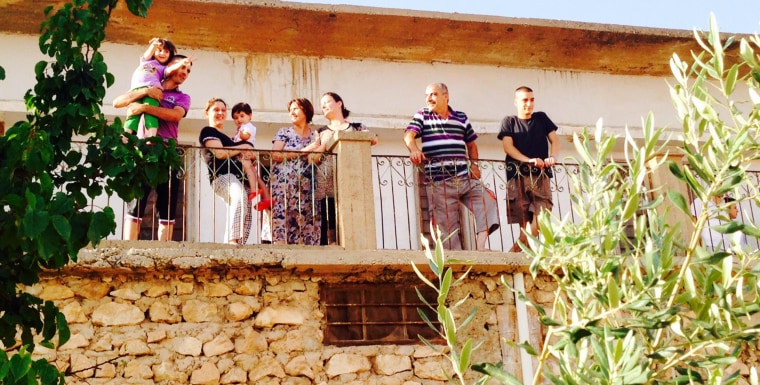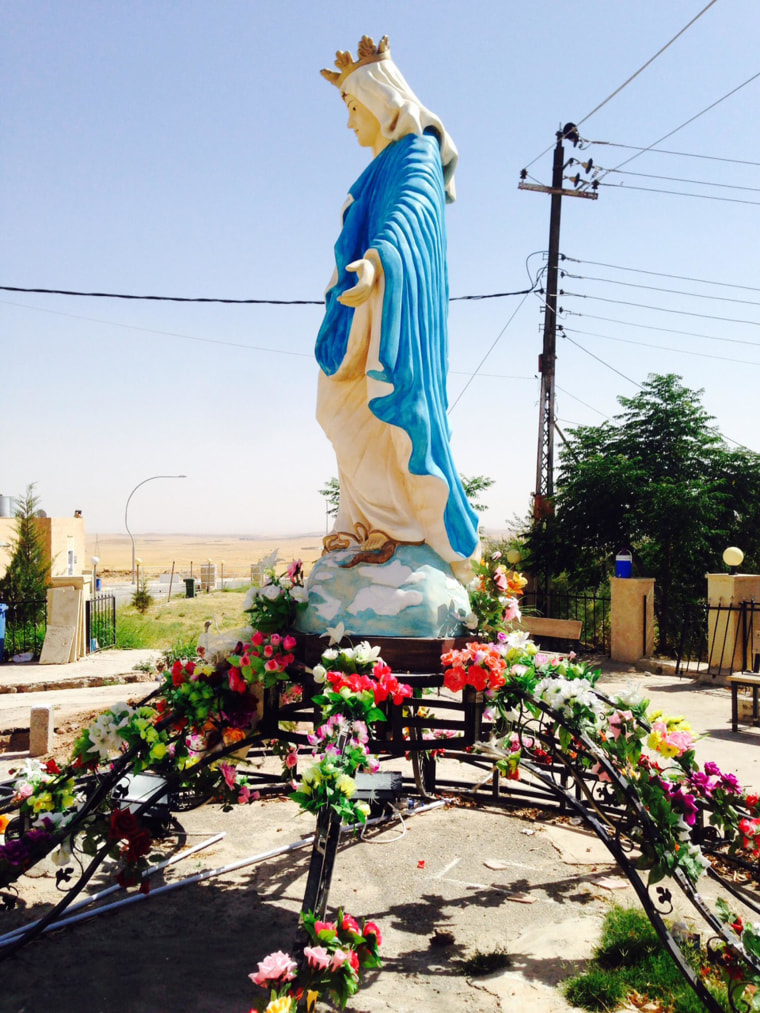AL-QOSH, Iraq — Christians spoke achingly Saturday about how they fled for their lives after their home city of Mosul was overrun by Islamist militants amid the country’s deepening turmoil.
The city, in northern Iraq, has been under the control of Sunni militants from the al Qaeda-inspired Islamic State of Iraq and al-Sham (ISIS) since a series of bloody battles on June 10.
Sign up for breaking news alerts from NBC News
The deepening unrest has turned tens of thousands of Iraqis into refugees as the militants set their sights on the capital of Baghdad.
Among those to flee Mosul are Christians who fled to Al-Qosh, a town about 30 miles south of the city. They told NBC News that they feared being caught up in the violence — but have not been targeted because of their faith.
“All families are in danger in Mosul, not only Christians,” said Leith Rahima, 57, who arrived last week with his extended family of 10. “It’s very dangerous, people are afraid of the Daash [ISIS men].”
Al-Qosh is a sleepy Christian town of 10,000 in Kurdistan nestled on the side of a mountain. Many of its old structures display symbols of Christianity, but its roots go even further back than that religion — at least 25 centuries — and some Jewish sites are present in town.
It’s not the first time that Rahima has fled from Mosul. “We left in 2006, 2008 and 2009,” he said.
In fact, the second time he left, he decided to permanently rent his apartment here. He can see Mosul in the distance when he opens his front doors.
He and his family hope that the situation there will improve and look forward to returning. He works for the Iraqi government as a dental technician and even brought his equipment and chair to Al-Qosh with plans to possibly set up a practice. He hasn’t, however, given his job up in Mosul and actually travels there to work.
“For now they live beside Christians,” he said of the Sunni militants who have seized Mosul. “I see many Daash [ISIS men] in Mosul. When they see me, we just wave and say, ‘Salaam.’”

So far, Al-Qosh remains untouched by ISIS. A Kurdish checkpoint about a mile down the straight road toward Mosul is the only sign of the military.
It has been a week since Rahima and his family arrived here, and his grownup children looked bored and despondent, having given up everything to seek safety. “I can’t talk about it,” one of his teenage daughters said before getting emotional and leaving the room, unable to deal with what she has left behind in Mosul.
Rahima is confident that he and his family will eventually return home, as he has done in the past. He doesn’t think Christians are particularly targeted in Mosul and said many of his friends still live there.
However, he said, “I certainly wouldn’t identify myself as a Christian to them [ISIS].”
Maan Basim, an electrical engineer, fled Mosul and brought his wife and two teenage children to Al-Qosh to stay at a friend’s house.
“My family is one of the most famous families in Mosul,” said Basim, sitting with his family in an open courtyard that had two beds and a television. “They have lived there for over a thousand years, and we have forever had good relations with all Iraqi ethnicities.”

Basim was heartbroken to leave the city.
“The clash is between the Daash and the Iraqi army, others are not in danger,” he said. “My pastor called me and said we had to leave Mosul for our own safety, Christians and Muslims.”
Basim’s fear is more about being caught in the crossfire rather than being targeted.
“I grew up in a place where there is no religious classification. You are not defined by your religion — that is what makes Mosul such a great place,” he said.
Although the population of Al-Qosh is Assyrian Christian, Shia Muslims have also found a refuge there. But they’re bunched together in schools, unlike their Christian neighbors from Mosul.
They expressed so much fear of ISIS that they were afraid to talk about their experiences or identify themselves. One 20-year-old who called himself Mohammed said: “If I go back to Mosul and they check my ID, they will kill me.”
NBC News' Alexander Smith, Michael Brunker, Gil Aegeter and Alastair Jamieson contributed to this report.